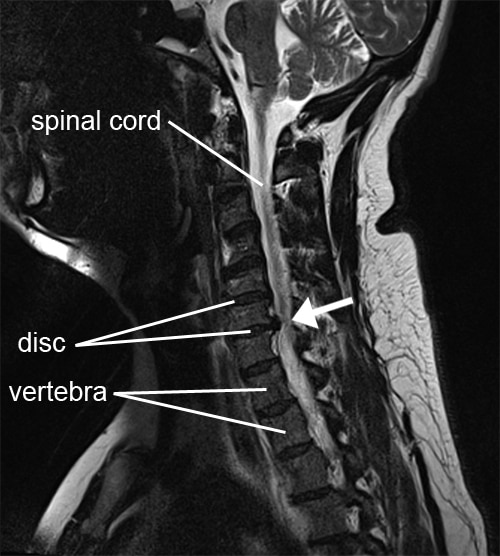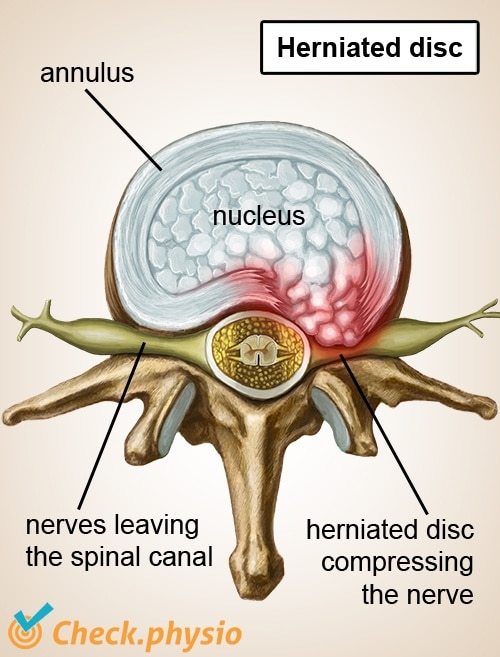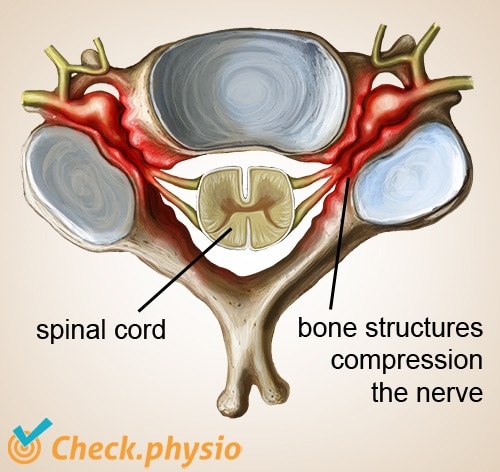Cervical radiculopathy
Neck hernia / cervical hernia / cervical disc protrusion
Cervical radiculopathy is a condition in which a nerve root in the neck becomes trapped in such a way that symptoms develop in the area innervated by the nerve. This is usually felt in the neck, arm and hand. The most well known form of cervical radiculopathy is a neck hernia.

Various factors can cause compression of a nerve root. This is usually caused by a neck hernia. We distinguish between two forms: a "soft" and a "hard" neck hernia. Both forms will be discussed in this article.
Description of condition
The upper part of the spinal column, the "cervical spinal column", is formed by the neck vertebrae. These bones are stacked on top of each other and provide the robustness of the spinal column. There are softer structures located between the hard vertebrae. These are the intervertebral discs. The intervertebral discs are slightly elastic and contribute to the shock absorbing capacity and mobility of the spinal column.
The spinal cord runs vertically through the spinal column. This is a large bundle of nerves that leave the spinal column and run to all parts of the body. In the neck, a number of nerves leave the spinal column at each vertebra. They run into the arms and control the muscles and ensure that sensory (e.g. pain) signals are passed on to the brain.
A soft neck hernia is caused by a prolapsed intervertebral disc placing pressure on a spinal nerve root. This can occur quite suddenly and can cause severe pain. A soft structure is pressing on the nerve root.
If compression of a nerve root is caused by loss of quality (degeneration) or osteoarthritis (wear-and-tear) of the neck vertebrae, we call this a hard neck hernia. The space through which the nerve roots leave the spinal column gradually becomes smaller. As a result, the nerve roots become constricted between the hard bone structures.
Cause and history
Signs & symptoms
- Pain in the neck.
- Pain in the arm, hand or shoulder region.
- Pins and needles, burning sensations or numbness in the arm and hand (fingers).
- Sometimes the pain may be felt as an "electrical" shock that suddenly shoots through the arm.
- The symptoms may become worse with coughing, sneezing or straining on the toilet.
- Possible loss of sensation and/or loss of strength.
- Certain movements of the neck may make the symptoms worse. For example, simultaneously moving the head backward and sideways. The physiotherapist will test this using the Spurling`s test.
Diagnosis
The diagnosis is made based on the patient's story, a physical examination and an MRI scan if surgery is being considered. A CT scan may sometimes be performed instead of an MRI. An EMG (electromyography) can provide additional information. However, this is not the protocol assessment to diagnose radiculopathy.
Treatment
The aim of the treatment is to reduce the compression of the nerve root. This is usually more successful with a soft neck hernia than with a hard neck hernia. Treatment initially consists of postural corrections. For example, the patient will be advised to avoid looking down for extended periods during tasks like reading or writing. In addition, the treatment may be aimed at training the neck and shoulder muscles, improving mobility and giving the nerve more space.
Wearing a semi-solid neck brace may have a positive effect on recovery in the acute phase, but should not be applied randomly.
There is less scientific evidence to support physiotherapy treatment being effective for hard neck hernias. However, treatment may be implemented due to the lack of alternatives other than surgical intervention. An anti-inflammatory injection may provide temporary pain relief. One must remember that this is not always risk-free.
Exercises
Take a look at the online exercise program here with exercises for cervical radiculopathy or neck hernia.
You can check your symptoms using the online physiotherapy check or make an appointment with a physiotherapy practice in your locality.


References
Nugteren, K. van & Winkel, D. (2012). Onderzoek en behandeling van de nek. Houten: Bohn Stafleu van Loghum.




